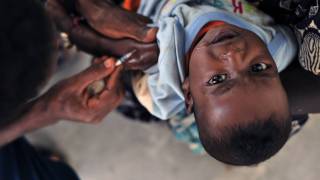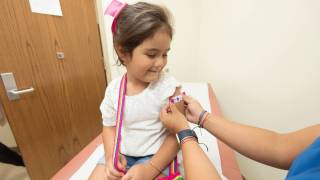Delay Children’s Vaccines, Does It Make Sense?

When parents decide to spread out and slow down a child’s vaccination schedule, most doctors say that’s a ‘risky decision.’
This vaccination timing decision has returned to media headlines given recent outbreaks of measles and mumps viruses during 2019.
Many pediatricians will tell you a more gradual approach to vaccinations is better than no vaccinations at all, but they offer some hard advice to parents who are considering it, reported Bernard J. Wolfson with Kaiser Health News.
These parents often limit the number of vaccines administered to no more than 2 per appointment, compared with up to 6 in the official vaccination schedule.
“Every day that you are eligible to get a vaccine and you don’t get one, the chance of an invasive disease remains,” says Dr. Charles Golden, executive medical director of the Primary Care Network at Children’s Hospital of Orange County.
The squabble is often painted as two-sided: the medical establishment, backed by science, strongly promoting the vaccination of children against 14 childhood diseases by age 2.
And the other side of the debate, a minority of so-called anti-vaxxers who believe the risks of vaccines outweigh the dangers of the diseases.
The notion that there are only two opposing sides obscures a large middle ground occupied by up to one-quarter of parents, who believe in vaccinating their children, but choose to do so more gradually.
These parents worry about the health impact of so many shots in such a short period of time.
“It’s important for parents to educate themselves on the vaccine schedule recommendations by talking with their pharmacist, doctor, or nurse. Sticking with the current recommended schedule is the only schedule with scientific evidence of disease prevention at this time,” said Lauran Ragan, PharmD, MTM and Immunization Specialist for Brookshire Grocery Company.
Alternative vaccine schedules have been around for years.
But scientific evidence does not support this alternative vaccination schedule option.
The Centers for Disease Control and Prevention (CDC) says everyday life presents far greater challenges to children’s immune systems.
Vaccinations help prevent disease outbreaks, protecting those who, for medical reasons, have not received the shots, says the CDC.
The CDC gives very specific guidelines on who should not receive vaccines, including kids who have immune system deficiencies, are getting chemotherapy or taking certain medications.
If your child has a condition you fear might be incompatible with vaccinations, discuss it with your doctor, nurse or pharmacist.
The CDC has published a detailed breakdown of the ingredients in every vaccine.
And yes, vaccine side effects do occur.
Most side effects are mild, but severe cases are not unheard of. And these issues should be reported to the CDC.
To learn more about the potential side effects of vaccines, look on the CDC website or discuss it with your healthcare provider.
Kaiser Health News (KHN) is a national health policy news service. It is an editorially independent program of the Henry J. Kaiser Family Foundation which is not affiliated with Kaiser Permanente.
This KHN story first published on California Healthline, a service of the California Health Care Foundation.
Our Trust Standards: Medical Advisory Committee


























